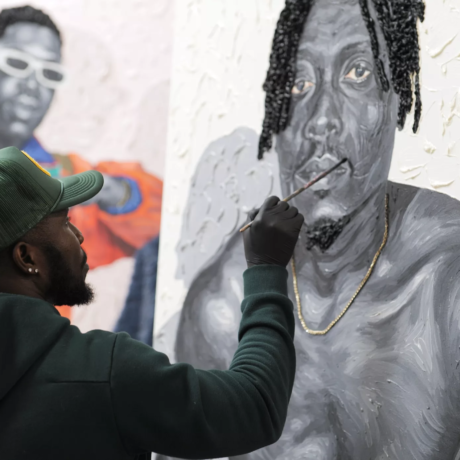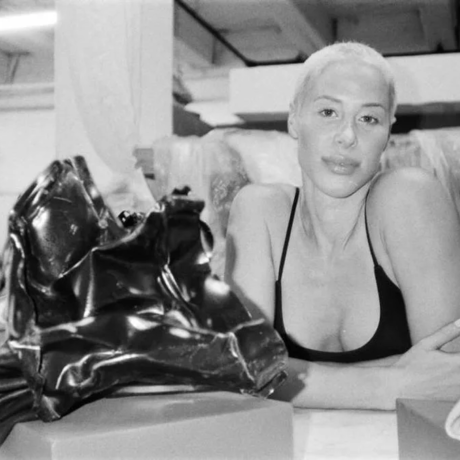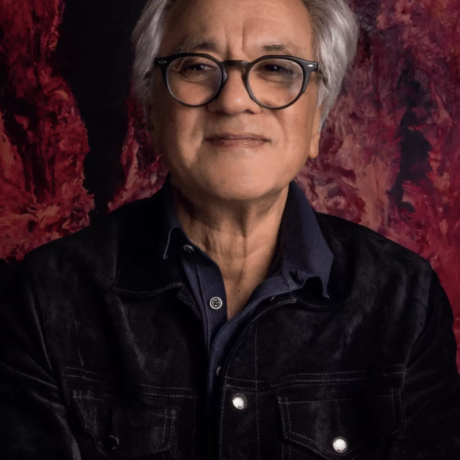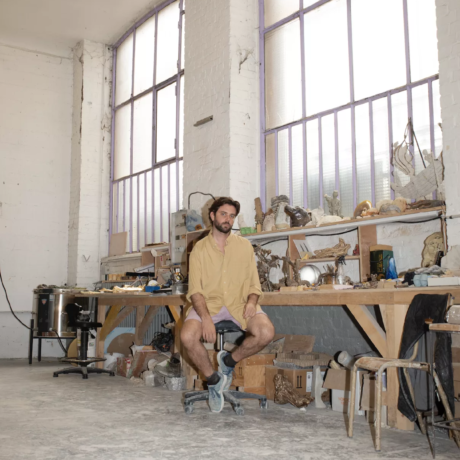
It should be obvious why an artwork that incites violence against images of women is not acceptable in 2020. Yet this week it became clear that sexism is alive and thriving, in a monumental installation commissioned as part of BredaPhoto festival in the Netherlands.
Erik Kessels, a 54 year-old artist and founder of an ad agency in Amsterdam, has installed 60 four-by-four metre photographs of women’s faces across a skatepark. He titled it Destroy My Face, asking skaters and visitors to eviscerate and eventually obliterate these women. The women are targeted in the work due to their botched plastic surgery that Kessels deems has turned them into “monsters”.
The inherent act of violence in both the creation and execution of this artwork are supported by the two public institutions that funded the work, BredaPhoto, an international photography festival, and Pier15, a skatepark in the city. The work features female-presenting composite portraits, in 60 images created by an algorithm that selected images from the internet of people who have undergone plastic and cosmetic surgery.
A group of artists, skaters, critics and students have written a searing open letter to BredaPhoto under the name We Are Not a Playground Collective—which you can sign here—urging the organisers to remove the work, and questioning why it was commissioned in the first place. The collective came together “in disbelief and outrage” after Kessels shared the work on Instagram on 10 September.
At the time of writing, however, and despite more than 2000 signatures on the petition, the work remains in place. The official information about the work on BredaPhoto’s website has since been updated to include a short response from Kessels to the criticism raised online, excusing it as “ironic” and as an attempt to “evoke a dialogue about self-acceptance.”
“Kessels only requests one interaction, to inflict metaphorical acts of brutality against their images”
In a statement made to Elephant, We Are Not a Playground, who chose to remain anonymous, write: “We do not see this petition as a ‘takedown’, or a manifestation of ‘cancel culture’: we are merely pointing out a glaring issue with a work that was funded and greenlit by the board, directors and curators of BredaPhoto 2020—and requesting them to take responsibility and do their jobs.”
In response to the open letter, BredaPhoto director Fleur van Muiswinkel privately contacted the collective to invite them to take part in an unpaid talk as part of the festival programme and debate the work in public with Kessels on 19 September. The festival did not respond to Elephant’s request to make their own statement about the work or why they commissioned it.
“They are asking us to put in more unpaid labour into this manifestation, and to take part in their programme where the power structures are clearly skewed,” the campaign group told Elephant. “This work does not open avenues for critical reflection or debate (or even ‘self-acceptance’ as Kessels puts it in his latest project statement), and so our arguments and demands are not up for discussion. This invitation is a performative gesture.”
As a large-scale installation in a public space that is still usually dominated by men, with the invitation to interact with the pictures by destroying them, it can only be seen as an act of ridicule and a direct attack aimed only at women, especially those who have had what Kessels deems to be too much surgery and end up “deformed”.
There is no mention of how the 800 people whose images are featured ended up in the work, and no attempt to situate them or their narratives. Instead Kessels only requests one interaction, to inflict metaphorical acts of brutality against their images. The photographs are composed of images of real people, while their stories and their individual agency is erased.

“This paltry piece of art does nothing to consider the nuances of the lives he has implicated“
The riposte from Kessels demonstrates his lack of accountability: “With this work I never wanted to offend anyone, but when reading recent comments online, I understand I’ve done so and I apologise for that. In my opinion the function of art in society is to start dialogues and I continue to believe in that.” The hackneyed argument of freedom of speech further implicates Kessels and his position of privilege: he has no fear of repercussions, even when faced with a backlash, and fails again to mention the people whose images are used in the work.
Kessels has said he finds plastic surgery “fascinating”, but this paltry piece of art does nothing to consider the nuances of the lives he has implicated in his work, nor does it say anything perspicacious about self-acceptance and its relationship to the photographic medium.
Conflicting points of view are essential in a healthy democratic culture. But uncritical, unchecked responses to situations that encourage physical acts of destruction against women or their images foster an environment of sexism, and should not be confused as freedom of speech.
As data reveals, violence against women has intensified during the pandemic. In the Netherlands more than 747,000 women over the age of 18 have experienced some form of violence or abuse in the last five years. Kessels has, as the open letter emphasises, a “responsibility to look at the outcome critically and think about the message that he is putting out into the world.”
We Are Not a Playground explained, “We will not be participating in their effort to filibuster the removal of this violent and degrading work. If BredaPhoto was really serious about wanting to correct their stance, they would do well to read our petition and listen to our suggestions. After our requests are met, we would be more than willing to talk to BredaPhoto about how to amend the damage done to their community.”
As long as this work remains installed, it serves as a damning indictment of the deeply entrenched misogynistic structures in cultural institutions, an endorsement of sexism, and a painful denial in the face of the real lived experience of women today.





